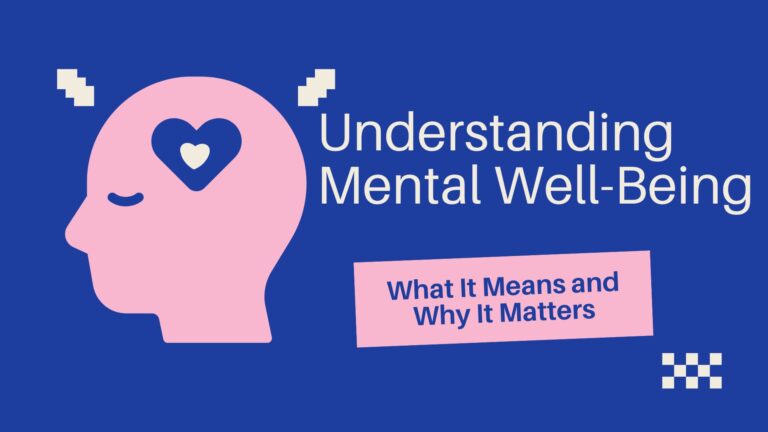Mental well-being is a crucial aspect of overall health, encompassing how we think, feel, and act in daily life. It affects our ability to cope with stress, relate to others, and make choices. Understanding mental well-being is vital not only for personal growth but also for building stronger communities and fostering healthier societies. This article explores what mental well-being means, its importance, and how to nurture it in our lives.

What Is Mental Well-Being?
Definition of Mental Well-Being
Mental well-being refers to a state of positive mental health that allows individuals to thrive. It encompasses emotional stability, resilience, self-acceptance, and a sense of purpose. Individuals with good mental well-being are better equipped to handle life’s challenges, maintain fulfilling relationships, and contribute positively to their communities.
Key Components of Mental Well-Being
- Emotional Resilience: The ability to bounce back from adversity and cope with stress.
- Self-Acceptance: Recognizing and accepting one’s strengths and weaknesses.
- Positive Relationships: Building and maintaining healthy connections with others.
- Purpose and Meaning: Having a clear sense of purpose in life and goals to strive for.
- Mental Flexibility: Adapting to change and being open to new ideas and experiences.
Why Mental Well-Being Matters
Impact on Overall Health
Mental well-being is closely linked to physical health. Poor mental health can lead to a range of physical ailments, including cardiovascular disease, obesity, and weakened immune function. Conversely, maintaining good mental health can enhance physical health, creating a virtuous cycle of well-being.
Influence on Daily Life
Good mental well-being allows individuals to engage fully in their lives. It enables us to manage stress effectively, make better decisions, and enhance our productivity. When we feel mentally balanced, we’re more likely to pursue our passions and maintain healthy relationships.
Contribution to Society
Individuals with strong mental well-being contribute positively to their communities. They are more likely to volunteer, participate in social activities, and engage in constructive dialogue. By promoting mental well-being, we can create a more compassionate and resilient society.

How to Nurture Mental Well-Being
1. Practice Self-Care
Self-care is essential for maintaining mental well-being. This includes prioritizing activities that recharge your mental and emotional batteries.
- Engage in Physical Activity: Regular exercise can boost your mood and reduce stress.
- Prioritize Sleep: Aim for 7-9 hours of quality sleep each night to enhance mental clarity and emotional stability.
- Eat a Balanced Diet: Nutritious foods fuel your body and mind, positively affecting your mood.
2. Foster Positive Relationships
Building and maintaining healthy relationships is crucial for mental well-being. Surround yourself with supportive and positive individuals who uplift you.
- Communicate Openly: Share your thoughts and feelings with friends and family to strengthen connections.
- Be Supportive: Offer help to others and be there for them during tough times.
- Engage in Social Activities: Participate in community events or groups to foster a sense of belonging.
3. Cultivate Mindfulness
Mindfulness practices can enhance mental well-being by promoting present-moment awareness and reducing stress.
- Meditation: Spend a few minutes each day meditating to calm your mind and improve focus.
- Deep Breathing Exercises: Incorporate deep breathing into your routine to reduce anxiety and promote relaxation.
- Gratitude Journaling: Write down things you are grateful for daily to shift your focus to positive aspects of life.
4. Seek Professional Help
If you’re struggling with your mental health, seeking professional help is a vital step. Therapists and counselors can provide guidance and support tailored to your needs.
- Therapy Options: Explore different types of therapy, such as cognitive-behavioral therapy (CBT) or mindfulness-based therapy.
- Support Groups: Join a support group to connect with others facing similar challenges.
- Open Dialogue: Don’t hesitate to talk to a trusted friend or family member about seeking help.
Conclusion
Understanding mental well-being is essential for cultivating a fulfilling life. It encompasses emotional resilience, self-acceptance, positive relationships, purpose, and mental flexibility. By prioritizing mental well-being, we can improve our overall health, enhance our daily lives, and contribute positively to society. Remember that nurturing mental well-being is an ongoing journey, and every small step you take can lead to a more balanced and fulfilling life.
FAQs
Why is mental well-being important?
Mental well-being is essential for overall health, influencing physical health, daily functioning, and contributions to society.
How can I improve my mental well-being?
You can improve your mental well-being by practicing self-care, fostering positive relationships, cultivating mindfulness, and seeking professional help when needed.
What are some signs of poor mental well-being?
Signs of poor mental well-being may include persistent sadness, anxiety, difficulty concentrating, withdrawal from social activities, and changes in sleep or appetite.
When should I seek professional help for my mental health?
Consider seeking professional help if you experience persistent feelings of sadness or anxiety, have difficulty coping with daily life, or have thoughts of self-harm.


